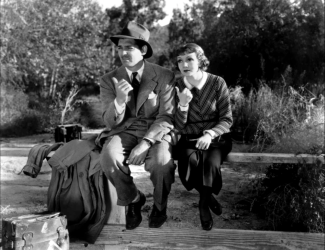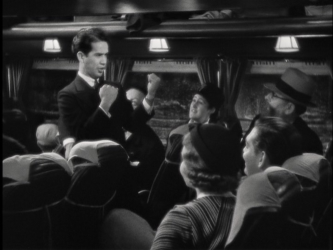The Flower has been excited since this film turned up on the “flashback” schedule back in December. Years ago, I gave her a CD of Judy Garland’s first hits, and she fell in love with the “Dear Mr. Gable” song which was melded with the 1913 classic “You Made Me Love You”.
Dear Mr. Gable,
I am writing this to you
and I hope that you will read it so you’ll know
My heart beats like a hammer
and I stutter and I stammer
every time I see you at the picture show
I guess I’m just another fan of yours
and I thought I’d write and tell you so
…
And if you don’t wanna read this, well, you don’t have to.
But I just had to tell you about the time I saw you in “It Happened One Night”.
That was the first time I ever saw you, and I knew right then you were the nicest fella in the movies!
I guess it was ’cause you acted so, well so natural like!
Not like a real actor at all, but just like any fella you’d meet at school or at a party.
Besides becoming a Judy Garland fan, she really wanted to see a Clark Gable picture, and we got the opportunity two weeks in a row, this film and Gone With The Wind. And, the kids having recently seen It’s A Wonderful Life had come to learn of Mr. Capra’s work firsthand.

On the road with Clark and Claudette.
The Flower had also come to see some of the more iconic scenes in the picture, like Claudette Colbert hitching a ride by hiking up her skirt a little bit and the classic “Walls of Jericho” divider—a blanket that Gable hangs up to demonstrate (however sarcastically) his good intentions with regard to Ms. Colbert.
The premise is familiar, even at the time, even with this film sometimes being considered the first “screwball” comedy: Colbert wants to marry a ne’er-do-well so her father has her locked in her room, she escapes and takes to the road in an attempt to reach her true love, and finds an unlikely assistant in a cantankerous, unlikable, and inevitable romantic partner (Gable). So, it’s a road picture, a romance, and a screwball comedy.
It’s also tremendously dated.

“Racy” in 1934. But look at those heels she’s tramping cross-country in!
But it works. Oh, how it works. And I think it works because it never forgets that it’s there to entertain. More than anything, in fact, it wants to entertain. It has no aspirations—nobody involved in the making thereof thought much of it, including Gable (who was being punished by MGM for his affair with Joan Crawford), Colbert (who bitched the whole time and only did it because it was a short, four-week shoot for which she got a double-salary of $50K) and Capra (who wrote the script but realized there must be something terribly wrong since everyone turned down the parts).
You could say that it’s because Colbert and Gable were icons who worked well, somehow, together, and while that’s true, their later collaboration (“Boom Town”, helmed by the capable Jack Conway) is all but forgotten.
Besides each scene being designed to delight the viewer, there’s a peculiar Capra trait that stands out for me here, and I just realized it’s true of all of the Capra pictures I’ve seen: Every character, no matter how minor, is meant to be a real, relatable and also rather delightful, too. If you haven’t seen this picture, you can think of It’s A Wonderful Life: Apart from the evil Mr. Potter, the characters tend to be both relatable and likable, even when they’re being cranky. Just think of some very minor characters, like the middle-aged grouch goading George into kissing Mary, e.g., or Bert & Ernie, or Violet. Flawed, certainly, but having an almost realer-than-life feel, just by not feeling like they’re there solely to read lines or advance the plot.

Like the bus full of people singing “Flying Trapeze”. (Allegedly the director.)
There’s also something so uniquely American about this: Gable is a rough, blue-collar guy while Colbert is a spoiled rich girl, and this movie manages to poke fun at both without making any real political statements. This kind of thing, come to think of it, was a lot more common. While Gable certainly shows up Colbert more than once, she gets in her licks, too. It’s almost as if they’re saying a person can be good even if they are rich!
Which is one of the ways, I suppose, this film comes off dated.
Another way is that Gable and Colbert act out a little dysfunctional domestic-abuse melodrama to hide from the private dicks her father has sent out to find her, and this is kind of played for laughs. I tend to see this as: Once upon a time, people understood that this sort of thing happened, and the fact that it was unsavory was no reason to pretend it didn’t or to turn it into a victim narrative.
Colbert, at right around 30, was rather old to play the role, but it doesn’t matter. She manages to ingenue her way through it. Gable, about 32, probably looks older than he was but he was Gable. Even if (or maybe because) their hearts weren’t in it, you can really see, and kinda buy, the whole wacky relationship. Which is after all the point.
We all loved it.

Gable’s lack of undershirt supposedly hurt T-shirt sales, so he wore them in his subsequent pictures.

For some reason, this post is getting pounded with spam, so I’ve disabled comments. I may turn them back on later.